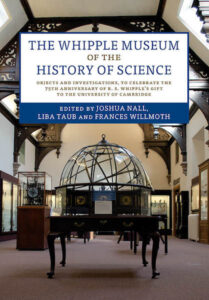 For those who may not previously have encountered the word, a Festschrift (from the German, Fest ‘celebration’ and Schrift ‘writing’.) is – as defined by the Oxford English Dictionary – “a collection of writings published in honor of a scholar.” However in the case of The Whipple Museum of the History of Science; Objects and Investigations, to Celebrate the 75th Anniversary of R. S. Whipple’s Gift to the University of Cambridge, the person so honored is a bit outside the now often somewhat limited definition of “scholar,” however the contributions made by him to the work of hundreds, if not thousands, of scholars over the past three-quarter of a century is truly beyond measure.
For those who may not previously have encountered the word, a Festschrift (from the German, Fest ‘celebration’ and Schrift ‘writing’.) is – as defined by the Oxford English Dictionary – “a collection of writings published in honor of a scholar.” However in the case of The Whipple Museum of the History of Science; Objects and Investigations, to Celebrate the 75th Anniversary of R. S. Whipple’s Gift to the University of Cambridge, the person so honored is a bit outside the now often somewhat limited definition of “scholar,” however the contributions made by him to the work of hundreds, if not thousands, of scholars over the past three-quarter of a century is truly beyond measure.
From his previous position as an assistant at Kew, Robert Stuart Whipple came to Cambridge “as the personal assistant to Horace Darwin, the founder of the Cambridge Scientific Instrument Company.” As the result of his tireless work with that famous company, combined with his personal interest in the practice of science, he eventually rose to the position of Managing Director of the firm and later to that of Chairman.
From his professional work developing scientific instruments, his extensive involvement with many learned and professional societies (he was a Founder-Fellow of the Institute of Physics, a Fellow of the Physical Society, and President of the British Optical Instrument Manufacturers’ Association), and his passion for learning all he could about the practice of science, he amassed a collection of over 1,000 scientific instruments, which in 1944 he donated to Cambridge, with which it was used as the founding collection of The Whipple Museum of the History of Science.
This new book presents selections of curated items from the museum’s now expanded, breath-taking collection, ranging from astrolabes to early electronic calculators, and explains some of the interesting and important work that has been made possible by their presence in the museum’s collection.
While this is an admittedly expensive book in it’s printed hardcover edition, the eBook version is within the price range of a standard trade hardcover; therefore all those with a serious interest in the history of science and the technology that has made it possible, as well as arisen from it, should add this one to their respective lists of books worthy of further investigation.
If you enjoyed reading this, please consider signing up for The Well-read Naturalist's newsletter. You'll receive a helpful list of recently published reviews, short essays, and notes about books in your e-mail inbox once each fortnight.
